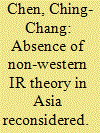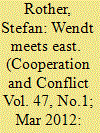| Srl | Item |
| 1 |
ID:
101959


|
|
|
|
|
| Publication |
2011.
|
| Summary/Abstract |
This paper critically examines an ongoing debate in International Relations (IR) as to why there is apparently no non-Western IR theory in Asia and what should be done to 'mitigate' that situation. Its central contention is that simply calling for greater incorporation of ideas from the non-West and contributions by non-Western scholars from local 'vantage points' does not make IR more global or democratic, for that would do little to transform the discipline's Eurocentric epistemological foundations. Re-envisioning IR in Asia is not about discovering or producing as many 'indigenous' national schools of IR as possible, but about reorienting IR itself towards a post-Western era that does not reinforce the hegemony of the West within (and without) the discipline. Otherwise, even if local scholars could succeed in crafting a 'Chinese (or Indian, Japanese, Korean, etc.) School', it would be no more than constructing a 'derivative discourse' of Western modernist social science.
|
|
|
|
|
|
|
|
|
|
|
|
|
|
|
|
| 2 |
ID:
112410


|
|
|
|
|
| Publication |
2012.
|
| Summary/Abstract |
The major theories of International Relations (IRT) differ significantly as far as their concepts of conflict and cooperation are concerned. However, they share one common denominator: They are deeply rooted in Western experiences and intellectual history. Recently, a growing literature on the possibilities and benefits of a non-Western IRT has emerged. This article proposes a 'via media': a theoretical approach that can be applied to Western and non-Western IR alike, taking into consideration the specific historical, ideational and cultural contexts. Based on social constructivism as developed by Alexander Wendt, it is argued that the existence of a collective identity among states in a given region can manifest itself in distinctive logics or cultures of anarchy. These are based on norms of conflict or cooperation that can be established through interaction, can be proposed by outside agents and localized, or can be affected by the re-negotiation of state identity caused by domestic events. In addition, there are cultural path dependencies: norms rooted in the cultural memory or consciousness of a region which tend to be ignored by interpretations that merely focus on current events or established Western models of cooperation. Area studies can contribute to provide this context.
|
|
|
|
|
|
|
|
|
|
|
|
|
|
|
|